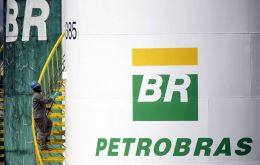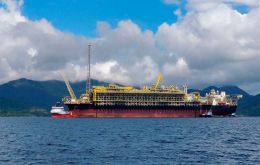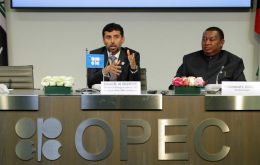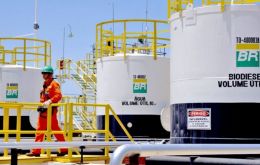MercoPress. South Atlantic News Agency
Tag: oil
-
Monday, July 2nd 2018 - 08:25 UTC
Saudi Arabia prepared to help with Trump's request “to pump more oil”, but gives no specifics

President Donald Trump said over the weekend that he had received assurances from King Salman of Saudi Arabia that the kingdom will increase oil production, “maybe up to 2,000,000 barrels” in response to turmoil in Iran and Venezuela. Saudi Arabia acknowledged the call took place, but mentioned no production targets.
-
Tuesday, June 26th 2018 - 09:06 UTC
Petrobras agrees to pay US$ 3bn in reparations to US investors

Brazilian state oil company Petrobras announced Monday that it would pay almost 3 billion U.S. dollars in reparations to U.S. investors who were harmed by the corruption ring within the firm. Brazil's largest company was sued in a class action lawsuit, which was approved on June 22 by a federal court in New York.
-
Tuesday, June 26th 2018 - 08:40 UTC
Saudis commitment to increase oil production to meet growing customer demand

Saudi Arabia’s state oil giant will meet customer demand for its crude after the country’s energy minister cemented a deal to boost global supply, according to Saudi Aramco CEO Amin Nasser.
-
Tuesday, June 26th 2018 - 08:35 UTC
Latest member to join OPEC expects to raise oil production by 65%

The Republic of Congo expects to raise oil production by as much 65% this year as two new projects come on stream, Hydrocarbons Minister Jean-Marc Thystere-Tchicaya said.
-
Tuesday, June 26th 2018 - 08:26 UTC
Petrobras begins operations at Tartaruga Verde field

Petrobras has announced the start of production at Tartaruga Verde field, in the deep waters of the Campos basin, by means of FPSO Cidade de Campos dos Goytacazes. The FPSO is located about 127 km off the coast of the state of Rio de Janeiro, in water depth of 765 m, with a capacity to process daily up to 150,000 bbl of oil and 3.5 MMcmg and 5 MMcm of gas compression.
-
Saturday, June 23rd 2018 - 10:29 UTC
OPEC ministers agree to increase oil supplies, but volume has to be decided

OPEC ministers announced a deal on Friday that will increase oil supplies from the producer group, which has been capping output in order to balance the market and boost prices for the last 18 months. The agreement came after a week of tense negotiation at OPEC's headquarters in Vienna, Austria. Top OPEC producer Saudi Arabia faced the challenge of convincing a handful of reluctant producers including Iran, Iraq, and Venezuela to support an output hike.
-
Saturday, June 23rd 2018 - 10:27 UTC
Exxon-Mobil made its eighth major oil discovery offshore Guyana

ExxonMobil made its eighth oil discovery offshore Guyana at the Longtail-1 well in the Stabroek Block on June 20. The company encountered 256 feet of oil-bearing sandstone. The well was drilled to 18,057 feet depth in 6,365 feet of water.
-
Friday, June 22nd 2018 - 09:10 UTC
Petrobras loses massive wage dispute, which could cost US$ 4.5 billion

Brazil’s top labor court on Thursday ruled in favor of workers at Petrobras in a wage dispute that could cost the world’s most indebted oil company up to 17 billion Reais (US$ 4.5 billion). Petrobras may still appeal the Superior Labor Court’s ruling in the case, brought by oil workers seeking more pay.
-
Thursday, June 21st 2018 - 08:57 UTC
Brazil eases rules in oil industry to boost production

Brazil’s move to ease rules forcing oil producers to buy from domestic suppliers means Latin America’s top producer will be able to sustain output of 5 million barrels per day (pbd) by the mid-2020s, compared to just 3.7 million bpd under prior rules, consultancy Wood Mackenzie said in a report on Wednesday.
-
Monday, June 11th 2018 - 08:20 UTC
Mexico's future closely linked to oil development no matter who's the next president

Mexican oil output could return to 2 million barrels per day by about 2022 if the next government pursues plans to auction off development blocs to private investors, Energy Minister Pedro Joaquin Coldwell announced. Mexico will elect a new president on July 1 but the front-runner in opinion polls, leftist Andres Manuel Lopez Obrador, has threatened to delay opening up the energy sector to private investment.
